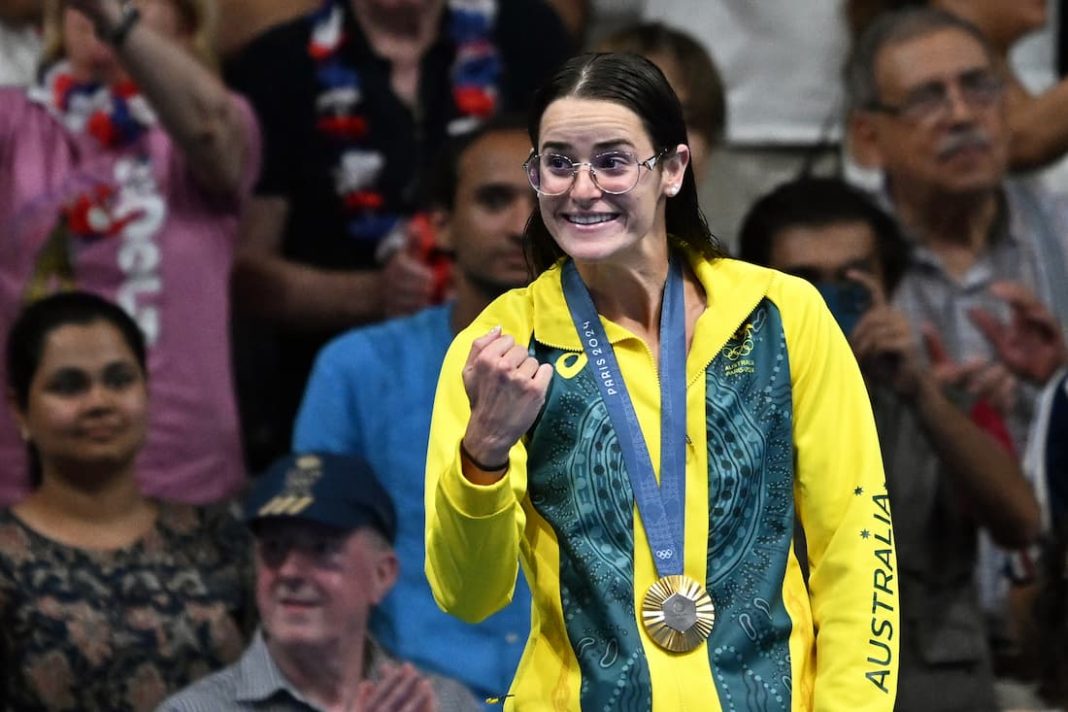Kaylee McKeown harnessed the spirit of her deceased dad to collect a coveted Olympic gold medal and then immediately set her sights on winning three more.
McKeown became just the second woman to win consecutive Olympic 100m backstroke gold medals with a stirring Tuesday night triumph in Paris.
The 23-year-old claimed Australia’s sixth gold in Paris – it’s the first time the nation has won gold medals on the initial four days at an Olympics.
Australia’s 4x200m freestyle relay team added a bronze medal while gun freestylers – Kyle Chalmers in the men’s and Mollie O’Callaghan and Shayna Jack in the women’s – secured slots in the 100m freestyle medal races.
McKeown joins American Natalie Coughlin (2004, 2008) as the only women to successfully defend Olympic 100m backstroke titles.
The 23-year-old edged the United States’ world record holder Regan Smith, racing with the spirit of her father Sholto, who passed away in 2020 after a prolonged battle with brain cancer.
“I have a little bit of a superpower and that’s my Dad … I know that he’s here in spirit,” she said.
McKeown won in an Olympic record time of 57.33 seconds with Smith taking silver in 57.66. Australia’s 18-year-old Olympic debutant Iona Anderson finished fifth.
“Kaylee is an absolutely incredible racer. And she knows what to do when it matters,” Smith said.
The American set the early pace and led at the turn, with McKeown in fourth place.
The Dolphin produced a stunning last-lap surge to victory.
“I knew it would come down to that last 25 metres,” McKeown said.
“It’s something that I’ve been practising for and it’s something that the Americans and myself are really good at, finishing our races strong.
“So it was going to be whoever had it in that last five, 10 metres.”
McKeown won gold in both the 100m and 200m backstroke events at the Tokyo Olympics three years ago.
She begins the defence of her 200m crown on Thursday and has added the 200m individual medley to her Paris program.
McKeown will also feature in the 4x100m medley – an event she helped Australia win gold at the Tokyo Games.
“It’s one race at a time and I’ve ticked off three boxes so far,” she said, referring to her 100m backstroke heat, semi-final and final swims.
“There’s a few more to go hopefully. It’s just a matter of … step by step.”
Australia’s 4x200m freestyle relay team of Max Giuliani, Flynn Southam, Elijah Winnington and Thomas Neill took bronze behind Great Britain and the United States.
And in the men’s 100m freestyle, Chalmers – the 2016 Olympic champion and silver medallist in Tokyo – won his semi-final in 47.58. He posted that exact time to take gold in Rio.
China’s world record holder Pan Zhanle was quickest through the semis in 47.21 after paying tribute to Chalmers pre-race.
“Pan, the Chinese boy, straight before we walked out said: ‘You’re my idol and I love, love, love watching you’,” the 26-year-old Chalmers said.
“So that was kind of crazy … to be inspiring this next generation of 100 freestylers and still being able to match them a little bit is is nice.”
In the women’s equivalent semi-finals, Jack and O’Callaghan, a night after her 200m freestyle triumph, both progressed to the medal race.
Jack (52.72) was second-quickest through the semis and O’Callaghan (52.75) was third.
Winnington, before his relay bronze, finished last in the men’s 800m freestyle final.
And compatriot Zac Stubblety-Cook’s defence of his Olympic 200m breaststroke crown is on track after being second-fastest qualifier for the medal race behind French megastar Leon Marchand.



